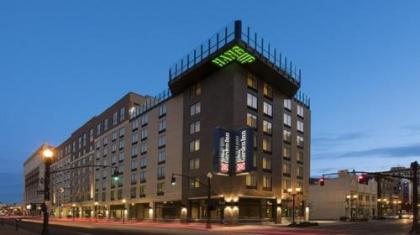Best Hotels Near Louisville Nature Center
1367 Gardiner Lane (1.7 km from Louisville Nature Center)
This Louisville Kentucky hotel is located 3 miles from Louisville International Airport and 5 miles from Churchill Downs home of the Kentucky Derby. Facilities include free Wi-Fi and on-site sport courts.
1614 Deerwood Avenue (1.8 km from Louisville Nature Center)
Louisville, Kentucky The Louisville Zoo is 1.9 miles away, and McDonald's Field is 3.1 miles away. This charming Derby city home features free WiFi, air conditioning, a garden, and barbecue facilities.
3330 Preston Highway Gate #6 (2.2 km from Louisville Nature Center)
Sleep Inn Louisville Airport & Expo is located less than a mile from the Kentucky Exposition Center. The hotel is close to Louisville International Airport, Churchill Downs, and the University of Louisville's Cardinal Stadium.
3322 Red Roof Inn Place (2.3 km from Louisville Nature Center)
Louisville International Airport is 4 miles from this Kentucky hotel. Red Roof Inn Louisville Fair and Expo provides a flat-screen cable TV with pay-per-view movies and video games in every room and free Wi-Fi.
4125 Preston Highway (2.4 km from Louisville Nature Center)
This Louisville hotel is close to Interstate 65 and Interstate 264 and features complimentary Wi-Fi and rooms equipped with a microwave and refrigerator. A mile away is the Kentucky Exposition Center.
1921 Bishop Lane (2.5 km from Louisville Nature Center)
This Louisville hotel is located 4.3 miles (6.4 kilometres) from the Kentucky Exposition Center and 2.4 miles (3.4 kilometres) from the Louisville Zoo.
(2.6 km from Louisville Nature Center)
Victorian Home 5Mi to Churchill Downs & Derby in Louisville offers accommodation with free WiFi 4.3 km from Louisville Slugger Field 4.4 km from Louisville Zoo and 5 km from KFC Yum! Center.
1862 Edgeland Avenue Louisville KY (2.6 km from Louisville Nature Center)
Located 2.7 mi from Louisville Zoo 3.1 mi from KFC Yum! Center and 3.1 mi from McDonald's Field 1858 Edgeland Avenue Unit One provides accommodations set in Louisville. It is located 2.
Top 10 Trending Hotels Near Louisville Nature Center See all
Enjoy Breakfast at the Hotels Near Louisville Nature Center See all
Budget Hotels Near Louisville Nature Center See all
Hotels With Great Access To Louisville Nature Center! See all
Louisville Nature Center, Louisville, KY
The Louisville Nature Center is a nature center located in Louisville, Kentucky. It is dedicated to the appreciation and understanding of nature, as well as promoting an appreciation of the natural world within this urban area. The Nature Center offers a variety of programs and activities that explore and reflect upon the natural environment surrounding Louisville. These activities include classes on bird watching, nature photography, plant identification, field trips, and more. In addition to its many educational programs, the Nature Center also hosts numerous events throughout the year such as special lectures and hikes, star gazing events and guided walks through local parks.
The Nature Center is home to many species of native plants and animals. Visitors can enjoy exploring the lush gardens with over 150 species of trees, shrubs and wildflowers or observing wildlife such as butterflies, birds, deer and foxes. This is also a great place for birdwatchers to go since there are dozens of different species in the area including woodpeckers, orioles, hawks and owls.
In addition to its educational programing and natural areas for exploration, the Louisville Nature Center also features beautiful trails that provide visitors with an opportunity to get out into nature by taking leisurely walks or biking along scenic routes. With over five miles of trails around its grounds visitors can enjoy a peaceful stroll amidst lush vegetation or take part in one of their organized hikes which offer varying levels of difficulty so everyone can find something suitable for them whatever their ability level may be.
The Louisville Nature Center is dedicated to connecting people with nature through their various programming options while also providing information about conservation initiatives in this area. They advocate for responsible land management practices that benefit both wildlife populations as well as human residents who rely on these resources for sustenance or recreation purposes. Additionally they encourage sustainable gardening practices within this region so further degradation of our natural resources can be avoided while helping build healthier communities overall.














































